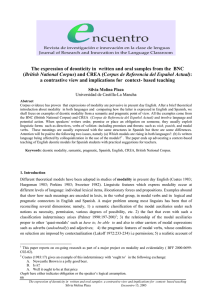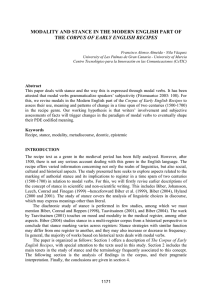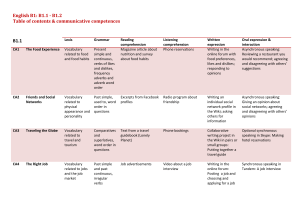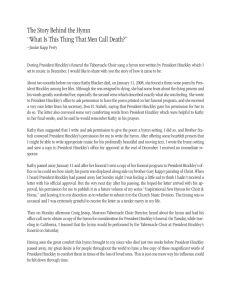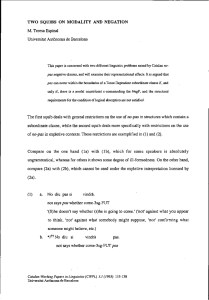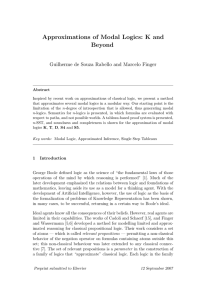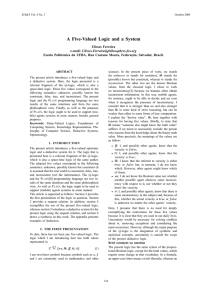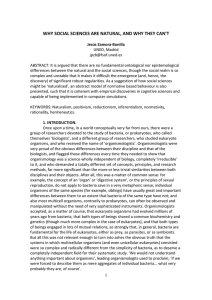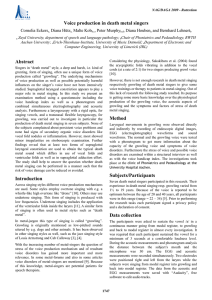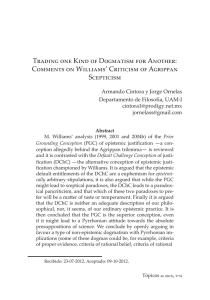Modality
Anuncio
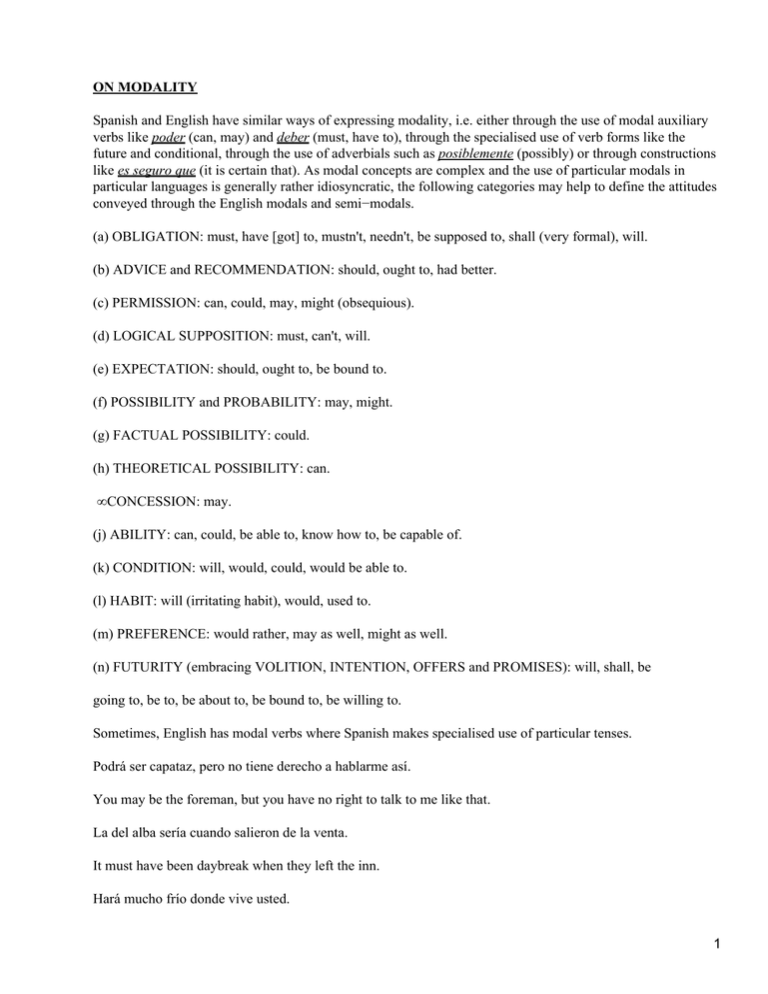
ON MODALITY Spanish and English have similar ways of expressing modality, i.e. either through the use of modal auxiliary verbs like poder (can, may) and deber (must, have to), through the specialised use of verb forms like the future and conditional, through the use of adverbials such as posiblemente (possibly) or through constructions like es seguro que (it is certain that). As modal concepts are complex and the use of particular modals in particular languages is generally rather idiosyncratic, the following categories may help to define the attitudes conveyed through the English modals and semi−modals. (a) OBLIGATION: must, have [got] to, mustn't, needn't, be supposed to, shall (very formal), will. (b) ADVICE and RECOMMENDATION: should, ought to, had better. (c) PERMISSION: can, could, may, might (obsequious). (d) LOGICAL SUPPOSITION: must, can't, will. (e) EXPECTATION: should, ought to, be bound to. (f) POSSIBILITY and PROBABILITY: may, might. (g) FACTUAL POSSIBILITY: could. (h) THEORETICAL POSSIBILITY: can. • CONCESSION: may. (j) ABILITY: can, could, be able to, know how to, be capable of. (k) CONDITION: will, would, could, would be able to. (l) HABIT: will (irritating habit), would, used to. (m) PREFERENCE: would rather, may as well, might as well. (n) FUTURITY (embracing VOLITION, INTENTION, OFFERS and PROMISES): will, shall, be going to, be to, be about to, be bound to, be willing to. Sometimes, English has modal verbs where Spanish makes specialised use of particular tenses. Podrá ser capataz, pero no tiene derecho a hablarme así. You may be the foreman, but you have no right to talk to me like that. La del alba sería cuando salieron de la venta. It must have been daybreak when they left the inn. Hará mucho frío donde vive usted. 1 It must be very cold where you live. ¿No será usted adivino, por casualidad? You wouldn't be a fortune−teller, would you? ¿Será posible? I can't believe it. When translating from English into Spanish, one of the main problems presented by modal verbs will be identifying which type of modality is being conveyed: deontic (concerned with obligation, permission or will) and epistemic (concerned with likelihood or certainty). The following English sentences, for example, if taken out of context, are ambiguous: You must love your mother a lot. Debes querer mucho a tu madre. (DEONTIC) Debes querer mucho a tu madre. (EPISTEMIC) Henry may keep the money. Enrique puede quedarse con el dinero. (DEONTIC) Puede que Enrique se quede con el dinero. (EPISTEMIC) This means that before translating a modal verb, you should check the context carefully to make sure you have understood the implications. The modals in the following sentences are also potentially ambiguous, but they have been placed in a context to disambiguate them. I'm Janice's father and this is an order: you may not see Janice again. Soy el padre de Janice y esto es una orden: no puedes ver más a Janice. You may not see Janice again: she's changing her job and is going to live away from home. Ya no vas a poder ver más a Janice: va a cambiar de trabajo y vivirá fuera de casa. She may be rich, but she dresses like a pauper. Será rica, pero viste como si no tuviera ni cinco. He should have finished by now: that was the arrangement, and he did promise! Debería haber acabado ya: quedamos así, ¡además, lo prometió! He should have finished by now −it's five o'clock and he works very fast. Ya debería haber acabado −son las cinco y trabaja muy deprisa. He must work faster if he's going to finish the exam. 2 Tiene que trabajar más deprisa si quiere terminar el examen. He's finished the exam already! He must work much faster than the others. ¡Ya ha terminado! Debe trabajar mucho más deprisa que los demás. REVIEW: VALUES OF MODALS must must Positive could Obligation have to Deduction have got to Negative can't needn't Lack of obligation don't have to might + formal should could Giving advice could Request would must may can will − mustn't Prohibition may not can't might + formal can Permission could Ability could may be able to can − might remoteness may should + formal Possibility could Suggestion would 3 can shall − must reality 4

